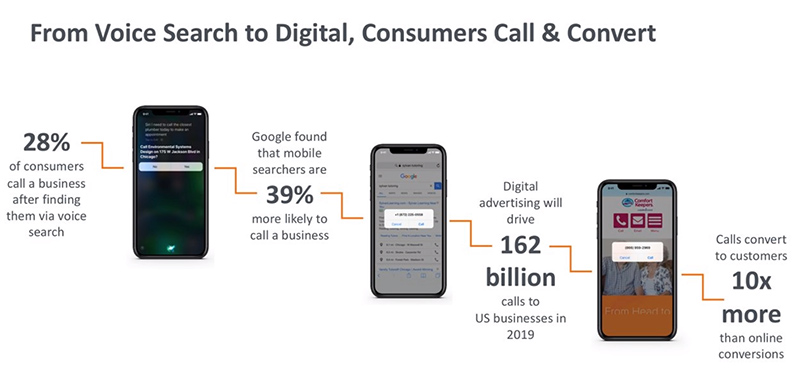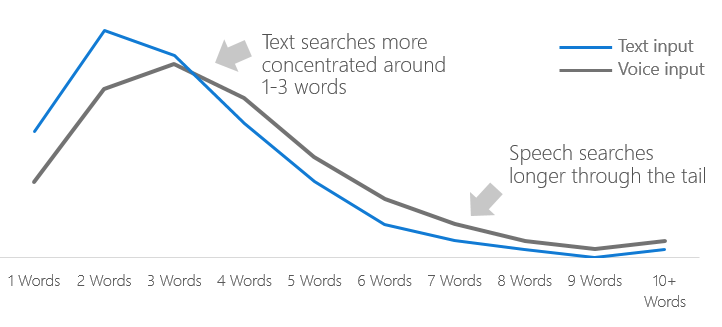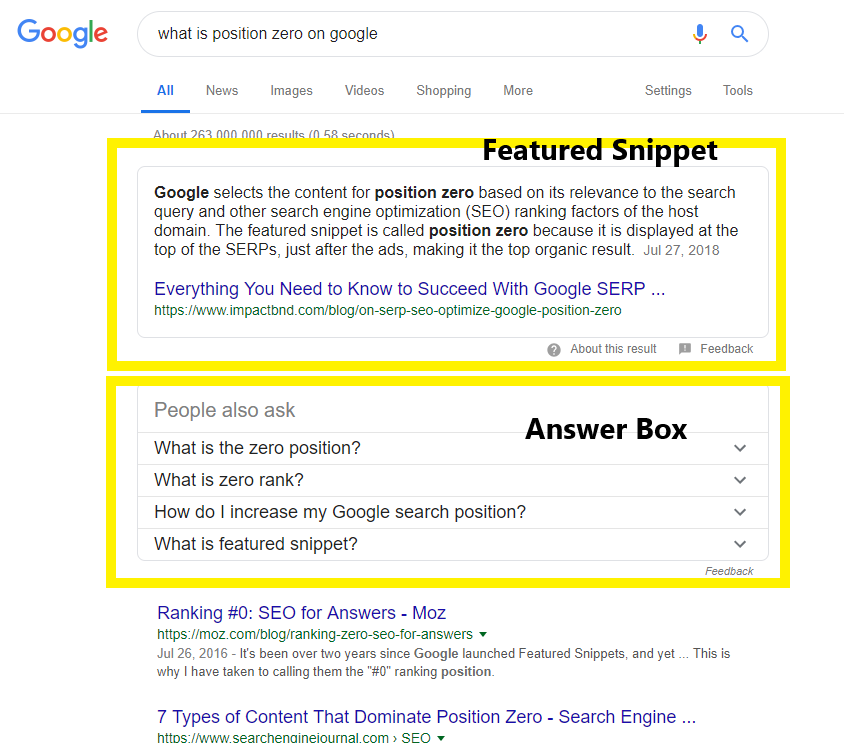This is an archived article and contains information that has not been updated or reviewed since it was originally published. For more information regarding the content in this article, please contact us.
Everyone in digital marketing is talking about the huge rise in smart speakers and digital assistants since 2018 and the new marketing avenues that voice-search represents. In this blog, we dig into how to position your company to leverage voice search.
Why you should optimize for Voice Search:
If you aren’t thinking about Voice Search, now is the time to start
Voice searches are growing rapidly. Adobe reports that almost 50% of consumers are using voice search. Voice search is not only popular among young people; while 55% of teenagers use mobile personal voice assistants daily, 40% of adults also are using mobile voice search. There has also been an impressive rise in the use of smart-speakers; in 2019 there were already an estimated 65 million voice-first devices in US homes. According to the ADI ComScore, more than half of smartphone users are participating in voice search.
Voice search is used in the car, at home, and “on the go”. Leveraging voice search gives a unique opportunity to meet user demands both based on context (gained through the mobile or smart device in use) and intent (based on what the user is looking for). Voice search is much more likely to lead to phone calls than website actions. The good news here is that phone calls are also 10x more likely to convert when compared to online leads. Ensuring your website is well-positioned to handle both traditional online search queries, as well as voice queries, will be a critical component of any digital marketing strategy in 2019.

What are the Characteristics of Voice Search Queries?
Voice search relies on Natural Language Processing (NLP), an emerging technology that uses artificial intelligence to analyze and interpret human language. Although very simple for our human brains, the process of our digital devices understanding human language is actually incredibly complex (see figure below or read more here).
As artificial intelligence improves its ability to process language, we can expect voice search to continue to be a very effective means of searching and finding relevant information.

Credit: https://seoexpertbrad.com
As technology evolves voice-enabled queries become more popular. In 2020 58% of voice queries are used to find local information. Generally, users are looking for immediate results such as directions, to make a phone call, or to dictate a text message. Voice search queries are much more likely to contain questions, and they tend to be more conversational when compared to traditional search queries.

What devices do people use to make voice searches?
Google currently dominates the market on smart-speakers (Google Home) in North America. Siri and Amazon also have a strong and growing market share. Other players like Microsoft continue to improve their digital assistant technologies and are expected to be viable contenders for market share in the coming years.
Tips on optimizing your website for Voice Search
The critical component of any digital marketing strategy is to understand your customer’s needs and how your business can fulfill those needs. To effectively meet your customer’s needs, your business must be present at most of the critical touch-points on the client’s path to purchase. Voice search should only ever be considered a component of a good digital marketing strategy; traditional SEO, social networking and PPC remain critical components of remaining competitive in the digital space.
Here is our list of tips to ensure your website is fully leveraging the potential of voice search queries:
1. Use structured data
Structured data is a standardized format that provides information about a page to search engines. Using structured data allows search engines like Google to understand and classify the content of your web pages.
A study by backlinko.com* found that the following schema is commonly represented in voice-generated results:
- Organization
- Person
- Imageobject
- Webpage
- Article
- Breadcrumb
2. Optimize your website for local searches
Voice search queries are often made when a user is looking for directions or trying to make a phone call. They are usually looking for immediate results to their question or problem. Ensure your website appears in local voice searches using these tips:
- Claim your Google Business Profile (formerly known as Google My Business) listing (“near me” queries are most likely to return a Google Business Profile result)
- Ensure your website and Google Business Profile listing have a consistent name, address, and local phone number
- Use location descriptors in your title tags and contact pages.
3. Have a mobile-friendly website
A critical component to being competitive online for any type of query (text or voice) is to have a mobile-friendly website. Backlinko.com’s* study found voice-queried websites loaded in 4.6 seconds. Google has made it very clear that having both HTTPS websites and responsive design are also critical components of ranking well in the search results.
- Page load times under 5 seconds
- HTTPS
- Responsive web pages
- Mobile-friendly user experience
4. Claim “Position Zero” (top search position)
41% of Google Assistant results are from Featured Snippets. 75% of voice results are from the top 3 positions in the Google organic search results. Use traditional SEO techniques and well-composed content to ensure your most relevant web pages are eligible for featured snippet and answer box opportunities.

5. Use Blog posts to answer questions
Blog posts are more likely to appear in featured snippets, answer boxes, and voice queries. Blog content that performs well on social media platforms is also more likely to appear in voice searches*. We recommend using regular SEO techniques to optimize your existing content to directly answer questions that your clients may be asking.
6. Write good content
Regardless of if it is a voice or text search, having good, easy-to-read content that answers a client’s query is essential for any project to improve SEO. Here are a few tips for writing good voice-search content:
- Write at a 9th-grade level (easy to read)
- Write long-form content (the average word count of ranking voice results is 2 300 words)*
- But write in “snackable” chunks; use lists and short paragraphs to make your content easy to digest (The typical voice search result is only 29 words in length)*.
7. Have strong domain authority
Voice search results seem to rely heavily on domain authority, rather than page authority*. To have good domain authority, you must:
- Have a domain with good standing in the eyes of the search engines (check out Google Search Console or Bing Webmaster tools)
- Have good quality backlinks from other domains
- Have a good quantity of backlinks from other domains relative to your competitors
- Be HTTPS
- Have web pages with good website structure and on-page optimization
- Have good signals from Social Media platforms (likes, shares, comments)
- Have a history of good domain authority (the older your website domain is, the higher your domain authority is likely to be)
Well, there you have it, 7 not-so-simple steps for leveraging voice search. If you are already executing a well-thought-out SEO strategy, ranking for voice search queries will likely happen naturally as the channel continues to grow. If you do not have a solid SEO strategy in place, Ontario SEO provides an integrated digital marking approach to ensure you reach your customers online at every point in their digital path to purchase.
*Backlinko.com Voice Search SEO Study



